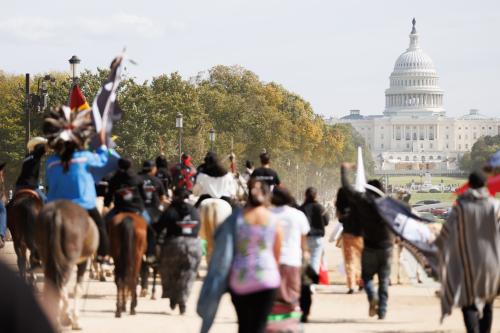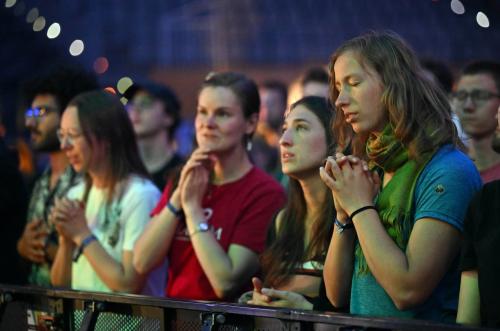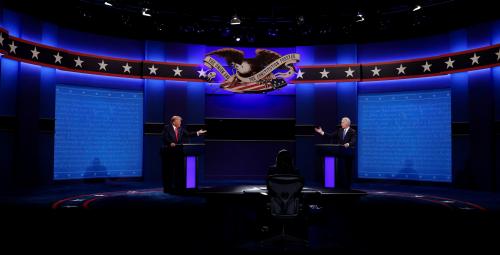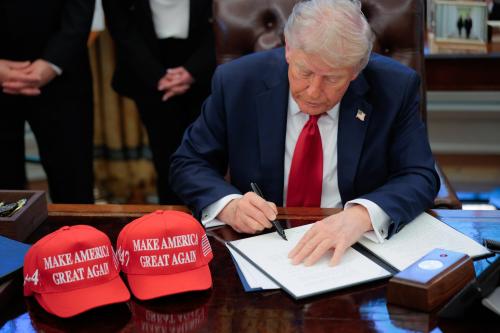Since Ronald Reagan’s 1980 victory over Jimmy Carter, Republican presidential candidates have benefitted from enthusiastic support of evangelical Christian voters, specifically white evangelicals. As demographics in the United States continue to shift, election analysts must understand the scale of evangelicals’ role in the Republican coalition, especially in swing states. Combining a few considerations about the size, demographic makeup, and voting behaviors of white evangelical Christians with an analysis of voters in an important swing state helps clarify why this electoral group is essential for any Republican coalition during the 2020 race to the White House.[1]
Size, demographics and voting habits of white evangelicals
About one in four American adults belongs to an evangelical Christian denomination according to a Pew Research Center 2014 study, making evangelicals the most common religious group just ahead of those without a religious affiliation. This percentage is down very slightly from a prior study in 2007. The National Election Pool exit polls found 26% of voters self-identified as white evangelical Christians in 2016. Beyond their total numbers, 64% of Evangelicals reported church attendance at least weekly compared to 35% of other Christians, suggesting a potential for a higher frequency of politically relevant messaging.
Evangelicals are demographically distinct on several politically relevant dimensions. The following numbers are based on the author’s analysis of a 2018 AP/NORC national survey.[2] Among registered voters in the Census Region South, 21% identify as white evangelicals compared to 13%, 14% and 8% in the West, Midwest and Northeast, respectively. White evangelicals were less likely in the sample to report income over $150,000 and bachelor degree or higher education levels. They also tended to be older. Among registered voters under 40 in the survey, 8% were white evangelicals compared to 19% among those over 40, pointing to a long-term problem for Republicans without a more diverse electoral coalition.
Embedded throughout this discussion is an assumption that the majority of evangelicals will vote for Republicans, and this assumption is well supported in survey data. The 2016 National Election Pool Exit Survey had Donald Trump leading Hillary Clinton among white evangelicals by a staggering 79% to 16%. In that exit survey, white evangelicals composed 46% of Trump’s coalition compared to 9% of Clinton’s coalition. The aforementioned 2018 AP/NORC survey found white Evangelical voters were roughly twice as likely to approve of Donald Trump’s job as president as other voters. While only a small percentage of white evangelical protestants consistently vote for Democrats or identify as liberal, they tend to cluster in certain churches and, consequently, could have substantial localized electoral impact.
Different surveys yield somewhat different numbers, but the overall direction is consistent: white evangelical protestants are a major component of President Trump’s coalition. The group tends to be older, of slightly lower socioeconomic status, and concentrated in the South.
The impact of white evangelicals on party preferences in a swing state
Beyond their scale, distribution, and demographics, the impact of being a white evangelical on partisan issue preferences merits consideration. Basic descriptive numbers from surveys show that evangelicals are much more likely than typical voters to support President Trump. However, these “topline” numbers from surveys can be deceptive. Simply because a subgroup has a higher rate of a certain behavior does not mean that being a member of the subgroup is driving the behavior. In the case of evangelicals, they often have other characteristics like being white and from red states that could explain much of their distinctiveness when it comes to voting.
In order to get a better sense of the impact of being an evangelical, we need to isolate the religious aspect of evangelicals from politically-relevant demographic factors associated with evangelicals. The following analysis is designed with that in mind and based on a February 2020 survey of North Carolina registered voters conducted by the Elon University Poll. Though the state has a relatively high percentage of white evangelicals, North Carolina is a worthwhile case study because it is a swing state with a high number of electoral college votes and because the state has a mixture of density, migration, and industries that make it a useful bellwether for regions within other swing states.
We asked respondents on a range of 16 issues, “Are you generally closer to the Democratic Party or the Republican Party when it comes to [ISSUE]?” I selected six issues particularly relevant to the 2020 presidential election for deeper analysis: the economy, healthcare, gun control, immigration, the environment and abortion. In order to control for factors related both to issue preferences and to being an evangelical, I estimated logistic regression models that controlled for age, gender, income, education and whether a respondent lived in a rural, suburban or urban county. The figures below report results from those models. They compare the predicted likelihood of a respondent saying their views are closer to the Republican Party depending on whether a respondent identifies as evangelical or not. All figures are limited to white non-Hispanic registered North Carolina voters.
The first figure shows the overall sample of 732 voters, which includes all registered voters, regardless of their party registration record. This shows substantial effects of being an evangelical for white voters in North Carolina as a whole. When it comes to abortion, evangelicals have a 63% probability of preferring the Republican Party over the Democratic Party or neither compared to a 36% probability for non-evangelicals. The other issues show similar statistically (p < 0.1) and substantively significant differences. Across all six issues tested, being an evangelical increases the likelihood that a voter feels closer to the Republican Party by an average of 24 points.
The overall sample reflected above does not control for party identification—the most important factor in voter decision making. To more fully illustrate how evangelical identification impacts party issue alignment, the remaining figures show results for the same models but with samples split by party of registration. Among the 331 white Republicans in the North Carolina survey, 71% were evangelicals. Notably, the changes were not as extreme for this group as the overall sample. For example, overall and not specific to issues, 83% of non-evangelical Republicans are predicted to prefer the Republican Party compared to 85% for evangelical Republicans. Differences were statistically insignificant for healthcare, the economy, immigration and gun control. However, differences were significant for abortion and the environment, which I attribute to the religious nature of the abortion debate and the relatively low identification with the Republican Party on the environment. That this figure does not show major differences between Republican evangelicals and non-evangelicals does not mean that the religious identity is unimportant for Republicans. Rather, Republican non-evangelicals are already so well aligned with their own party that the baseline for comparison is too high for the religious identity to make a discernible difference.
The 163 white Democrats in our North Carolina sample were split 47% evangelical, 53% non-evangelical. Not surprisingly, these Democrats were unlikely to align with the Republican Party on any of the issues. However, for all six issues tested, the gap between evangelicals and non-evangelicals was statistically significant. On average, being an evangelical increased registered Democrats likelihood of breaking with their party and preferring the Republican Party on specific issues by 17%. Being an evangelical almost doubles the likelihood that a Democrat favors the Republican party on abortion, an issue with clear party platform distinction. However, support for the Republican Party is only 23% even among evangelicals.
Some of the impact of evangelical identification is likely attributable to a mismatch in party registration and psychological party attachment—a legacy of historically conservative Southern Democrats who still have not changed their official party registration to Republican. However, these effects exist even when controlling for age and residence in a rural county. Thus, I expect the gap is driven more by religion presenting a partisan cleavage among a minority of Democrats in the swing state.
In the important swing state of North Carolina, registered unaffiliated voters compose an ever increasing one-third of the electorate, and 60% of these white unaffiliated voters in North Carolina identify as evangelical. Models limited to the 220 white unaffiliated voters in the Elon Poll sample reveal the greatest potential for evangelical identification to aid Republican candidates: by influencing swing voters in swing states. The average difference in Republican Party support between evangelical and non-evangelical unaffiliated voters is 15% across the six issues. The difference was statistically insignificant only for views on the economy. As one might expect, the evangelical impact on abortion was particularly potent, raising Republican Party support from 36% to 60%.
Evangelicals: Key for shoring the Republican base and persuading the middle
Issue alignment changes depicted above may reflect voters’ more general sense of overall ideological leaning, but the fact that religious effects vary by issue suggests that, for many evangelical voters, Republican positions on specific issues make a difference. Being an evangelical helps to fortify the issue alignment between the Republican Party and their base of Republican voters, especially on abortion. However, evangelical identity has an even more important role among voters outside of the Republican partisan base. Evangelical identity has its largest and most electorally relevant impact by encouraging issue alignment between unaffiliated voters and the Republican Party orthodoxy. Even among white registered Democrats, being an evangelical moves the needle at the margins for the Republican Party, at least enough to secure a small percentage of votes with potential to change the outcome of close elections.
Given the number of white evangelicals in the electorate (according to CNN exit polls, they composed 38% of the North Carolina electorate in 2016), the slim historical margins of victory in swing states, and the impact associated with being an evangelical on partisan preferences, Republicans are reliant on the group’s support and mobilization in order to accumulate 270 Electoral College votes. Though President Trump is a candidate whose personal behavior has often been at odds with the values espoused by many evangelicals, any potential path he has to remain in the White House after January 20, 2021 must pass between the pews of white evangelical churches. In turn, Democratic Party leaders have opportunities to interrupt that passage by paying attention to evangelicals, especially unaffiliated evangelicals persuadable to add their votes to the 2020 Democratic coalition.
[1] A common approach to identify evangelicals within a survey sample is to ask a question to determine religious tradition (e.g. Christian, Muslim, Jewish, etc.) and then ask Christians if they identify as a “born-again” or evangelical Christian, or not? Most election polls and exit surveys rely on this simple approach, despite it having some potential for misclassification. The American National Election Study and other organizations use a better, but much more costly and time-consuming approach that codes respondents based on a series of questions identifying a specific denomination.
[2] Percentages are rounded and limited to registered voters who reported being both non-Hispanic white and evangelical or born-again, the key group with electoral significance to Republicans for this discussion.
The Brookings Institution is committed to quality, independence, and impact.
We are supported by a diverse array of funders. In line with our values and policies, each Brookings publication represents the sole views of its author(s).







Commentary
Why Trump is reliant on white evangelicals
April 6, 2020